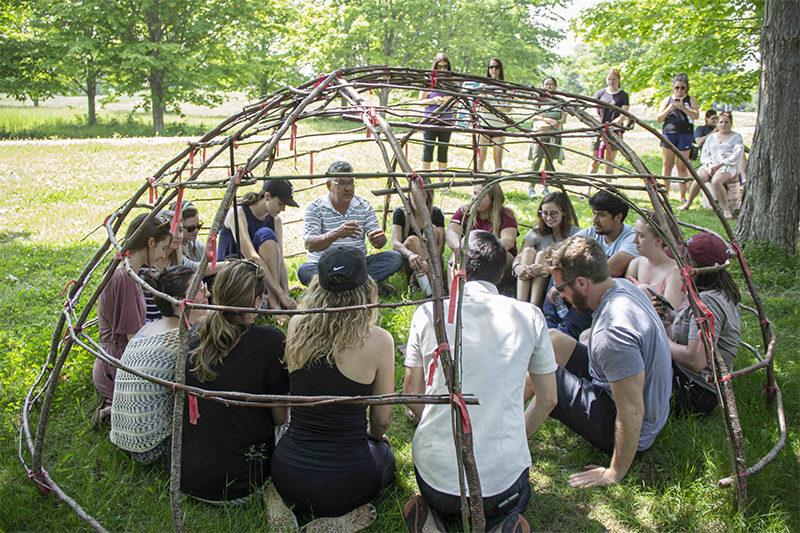Section 1 : Eastern Door ~ The Rising Sun
Course Information
Let us begin by examining the course description, learning objectives, and sessions that comprise IKE-1040: Indigenous Teachings of Turtle Island. Instructors may introduce their own material, content, and approaches to the course, as is expected; yet, I trust what has been developed can be of assistance.
Course Description
With respect to the traditional and unceded territory of Epekwitk (PEI) and Mi’kma’ki, this course is an introduction to the three groups of Indigenous peoples recognized in Canada. Anchored in Indigenous knowledges, students will learn about ceremonies, protocols, traditions and cultures. This course further introduces Canada’s history of colonization and cultural assimilation policies. These will help to begin fostering an understanding of Indigenous worldviews and fulfill the University of Prince Edward Island’s commitment to the Truth and Reconciliation Commission’s Calls to Action.
Goal and Learning Outcomes
The goal of this course is to deepen a student’s (future leaders) understanding about Indigenous peoples, their knowledge systems, histories, cultures, traditions, and resiliencies within the context prolonged and devastating colonial policies and practices that has led to Calls to Action so healing, truth and reconciliation can be realized. All UPEI students will require this course to be conferred a degree and is vital to all relations. Specific student learning outcomes include:
- To define the key themes of important Indigenous and non-Indigenous relations historically and in contemporary society, including Indigenous Peoples’ histories, pathways to healing, reclamation of culture, and contemporary contributions.
- To develop and articulate one’s own objective in reconciliation and decolonization based on an informed understanding of the TRC Calls to Action.
- To explain Indigenous worldviews, and ways of knowing, being, and doing in comparison with Western worldviews.
- To assess and cultivate personal and professional competence and confidence to become a responsible citizen in reconciliation and broader application.
- To discuss issues of equity for Indigenous Peoples by analyzing historical and contemporary systemic policies of colonialism and assimilation.
- To explain the significance and meaning of Indigenous practices relating to ceremony and relationships.
- To explain major issues emanating from assimilation and genocidal practices.
Sessions (Chapters) at a Glance
- Session 1: Welcome and Traditional Opening of Circle
- Session 2: What is Canada? ~ What is Turtle Island? ~ Who are the Mi’kmaq Peoples? ~ What are Teachings?
- Session 3: Cultural Practices ~ Indigenous Ways of Knowing, Being, and Doing ~ Terms, Identity, and Meaning
- Session 4: History of Indigenous Peoples in Canada, United States, Mexico, and the Caribbean
- Session 5: Mi’kmaq Historians ~ Mi’kmaq Social Values and Economy ~ Treaties ~ Royal Proclamation Act of 1763 ~ Indian Act of 1876
- Session 6: Colonialism ~ Colonization Practices of the Indian Act ~ Indian Residential Schools ~ Genocide
- Session 7: Trauma and Intergenerational Trauma ~ Traditional Healing ~ Contemporary Health, Healing, and Wellness
- Session 8: Land Dispossession ~ Systemic Racism ~ Right to Self-Determination
- Session 9: Indigenous Resilience ~ Reclamation ~ Resistance
- Session 10: Indigenous Peoples in the 21st Century
- Session 11: Truth and Reconciliation ~ Calls to Action ~ Responsible Citizenship
- Session 12: Honouring Msit No’kmaq ~ Wahkohtowin ~ All Our Relations and Closing of Circle
And now, let the learning begin…


